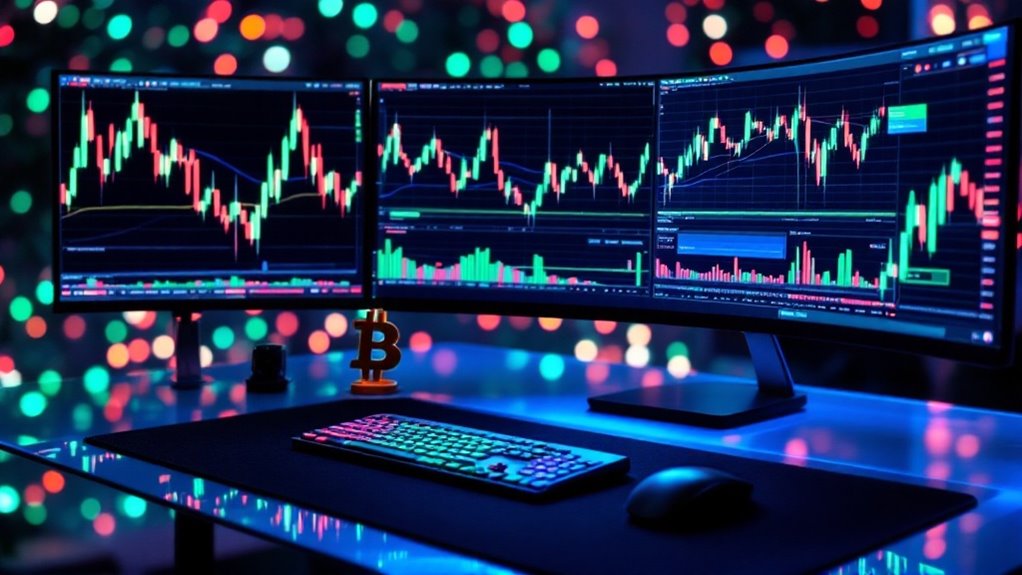Decentralized exchanges (DEXs) represent a revolutionary shift in cryptocurrency trading, operating without middlemen through smart contracts on blockchain networks. Unlike traditional exchanges, DEXs allow traders to maintain control of their assets while executing peer-to-peer transactions with enhanced security and transparency. These platforms use automated systems for pricing and typically offer lower fees, though they can present technical challenges for newcomers. The evolving DEX landscape hints at an intriguing future where traditional finance meets blockchain innovation.

As cryptocurrency markets continue to evolve, decentralized exchanges (DEXs) have emerged as a revolutionary alternative to traditional trading platforms. Like digital town squares where traders meet directly, DEXs operate without intermediaries, using smart contracts and blockchain technology to facilitate peer-to-peer transactions. The bustling marketplace hums with activity as traders connect wallet-to-wallet, their transactions permanently etched into the blockchain's transparent ledger. These platforms generally provide lower trading fees than their centralized counterparts.
The landscape of DEXs is diverse and vibrant, featuring various approaches to trading. Automated Market Makers like Uniswap have transformed the trading experience, replacing traditional order books with mathematical formulas that determine prices. Meanwhile, platforms like Curve focus on specialized markets, orchestrating efficient stablecoin swaps with the precision of a well-tuned instrument. Users maintain custody of their assets through their personal wallets throughout the trading process.
The allure of DEXs lies in their fundamental principles of accessibility and security. Traders worldwide can participate without geographical restrictions, their funds secured by cryptographic protocols rather than centralized authorities. This democratic approach to trading has resonated with users, propelling DEX trading volume past the trillion-dollar milestone in 2022, with Uniswap alone orchestrating billions in daily trades. The Ethereum platform serves as the foundation for many leading DEX solutions, enabling seamless integration with the broader DeFi ecosystem.
However, the path of decentralization isn't without its thorns. Like a newly paved road with occasional bumps, DEXs face challenges such as limited liquidity and technical complexity. The user experience can feel like maneuvering a sophisticated spacecraft compared to the familiar comfort of traditional exchanges. Network congestion can slow transactions to a crawl, testing traders' patience during peak market activity.
Despite these growing pains, DEXs continue to evolve and innovate. The ecosystem now spans over 40 major platforms, each contributing unique features to the decentralized trading landscape. From derivatives trading on dYdX to the yield-farming opportunities on PancakeSwap, these platforms are pushing the boundaries of what's possible in decentralized finance.
As the technology matures and users become more sophisticated, DEXs stand poised to reshape the future of cryptocurrency trading, one smart contract at a time.
Frequently Asked Questions
How Do DEX Liquidity Providers Earn Money From Their Cryptocurrency Deposits?
Liquidity providers earn through trading fees collected from swaps, liquidity mining rewards in native tokens, yield farming strategies across protocols, and staking LP tokens for additional returns on their deposited assets.
Can DEXS Be Hacked, and What Security Measures Protect User Funds?
Yes, DEXs can be hacked through smart contract vulnerabilities, flash loan attacks, and price manipulation. Security measures include third-party audits, multisignature wallets, real-time monitoring, and user-level protection like hardware wallets.
Why Are Gas Fees Higher on Decentralized Exchanges Compared to Centralized Ones?
Gas fees are higher because each trade requires on-chain blockchain validation and smart contract execution, while centralized exchanges process transactions off-chain, avoiding network validation costs and computational expenses.
Which Blockchain Networks Host the Most Popular Decentralized Exchanges Today?
Ethereum and Solana currently dominate the DEX landscape, with Ethereum hosting major platforms like Uniswap and Curve Finance, while Solana captures significant market share through platforms like Jupiter and Raydium.
How Do DEX Aggregators Help Users Find the Best Trading Prices?
DEX aggregators scan multiple exchanges simultaneously, using smart routing algorithms to compare prices, analyze liquidity pools, and split trades across platforms, ultimately finding the most cost-effective execution paths for users' transactions.









